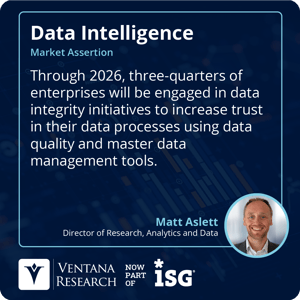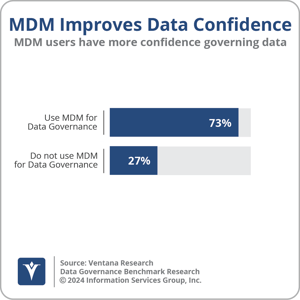I previously explained how master data management helps provide trust in data, making it one of the most significant aspects of an enterprise’s strategic approach to data management. More recently, I discussed how it has a role to play in accelerating data democratization as part of data intelligence initiatives. Along with data quality, MDM enables organizations to ensure data is accurate, complete and consistent to fulfill operational business objectives. While it is an established and mature sector of the market, MDM is also a primary focus for innovation in data management, with vendors such as Stibo Systems incorporating artificial intelligence capabilities to automate approaches to mastering data that have traditionally been manual and time-consuming, improving operational efficiency and time to value.
Stibo Systems is one of the data management industry’s longest-standing MDM software specialists. It was established in 1976 with a focus on product information management and is a subsidiary of Stibo Group, which also provides software for print and electronic publishing as well as commercial printing. Stibo Group is owned by the not-for-profit Stibo Foundation—the roots of which can be traced back to the original founding of the company as a printing house in 1794. Stibo Systems reported revenue of $155.6 million in its 2022-23 fiscal year, up 15% from $135.3 million the previous year, with much of that growth fueled by adoption of cloud subscription contracts rather than traditional on-premises software licensing.
is a subsidiary of Stibo Group, which also provides software for print and electronic publishing as well as commercial printing. Stibo Group is owned by the not-for-profit Stibo Foundation—the roots of which can be traced back to the original founding of the company as a printing house in 1794. Stibo Systems reported revenue of $155.6 million in its 2022-23 fiscal year, up 15% from $135.3 million the previous year, with much of that growth fueled by adoption of cloud subscription contracts rather than traditional on-premises software licensing.
More than 250 customers are consuming Stibo’s MDM software via cloud subscriptions, increasing recurring revenue as a proportion of the company’s overall business. It was rated Exemplary in the Ventana Research Buyers Guide for Product Experience Management.
PIM functionality remains at the heart of the Stibo Systems Enterprise Platform, as PIM is a natural starting point for many enterprises to embark on MDM initiatives, along with customer data integration. However, Stibo Systems has long since expanded beyond PIM to provide multi-domain MDM capabilities based on data related to customers, suppliers, partners, locations, workers and digital and physical assets, as well as reference and third-party data. Increased investment in multi-domain MDM, as well as artificial intelligence-enabled automation functionality, is driving continued growth in the MDM sector, thanks to initiatives to establish trust in data to enable self-service access. In fact, Stibo System has made progress in this area from our earlier coverage. I assert that through 2026, three-quarters of enterprises will be engaged in data integrity initiatives to increase trust in data processes using data quality and master data management tools.
“Master data” is the term used for an enterprise’s foundational reference data, providing an agreed list of entities and definitions that can be shared throughout the organization. MDM is the practice of managing the master data and encompasses processes such as data validation, matching and merging duplicate records and enriching data with related information.
Another important component of MDM is data modeling, which documents the relationships between data elements. Having agreed data definitions is integral for enterprises to make decisions based on data that is trusted to be valid and accurate. Our research shows that MDM is integral to establishing confidence in the data used by enterprises for operational and analytic decision-making. One-half of participants in Ventana Research’s Data Governance Benchmark Research cite agreement on the definitions of data as a primary concern in managing data effectively, while almost three-quarters (73%) of enterprises using MDM for data governance are confident in the organization’s ability to govern and manage data across the business, compared to only 27% of those that do not use MDM for data governance.
decisions based on data that is trusted to be valid and accurate. Our research shows that MDM is integral to establishing confidence in the data used by enterprises for operational and analytic decision-making. One-half of participants in Ventana Research’s Data Governance Benchmark Research cite agreement on the definitions of data as a primary concern in managing data effectively, while almost three-quarters (73%) of enterprises using MDM for data governance are confident in the organization’s ability to govern and manage data across the business, compared to only 27% of those that do not use MDM for data governance.
The benefits of MDM are well understood, and MDM as a discipline has been an important aspect of data management for decades. However, it is also traditionally seen as a complex, costly and manual task that requires expert users and can slow innovation by failing to move at the pace of change required by contemporary enterprises. While this may have been true of legacy MDM products, the use of artificial intelligence and machine learning in today’s MDM software, as well as cloud consumption, increases automation, accuracy, agility and speed.
Stibo Systems Enterprise Platform, also known as STEP, provides a single platform for managing multi-domain master data. It uses AI for automated data classification, data deduplication and image recognition as well as automated data onboarding and syndication. STEP includes an in-memory database to accelerate data query and resolution-handling performance and a data-as-a-service extension to ensure that worker- and customer-facing applications have real-time access to master data. STEP also includes a GraphQL application programming interface to enable development of web and mobile applications that integrate with STEP for access to master data.
In addition to multi-domain MDM, STEP can also be used to address use cases targeted at product data, customer data, supplier data and location data in industries such as retail, distribution, manufacturing, consumer packaged goods and financial services. Stibo Systems also provides training and education services designed to facilitate the practice of data mastering as well as the use of Stibo Systems’ MDM software.
Stibo Systems continues to enhance multi-domain MDM capabilities. We expect further automation, including generative AI services and enhancements around environmental, social, governance and sustainability, which are key, long-term development focus areas for the company. I recommend that enterprises considering potential suppliers for multi-domain MDM—as well as initiatives focused on customers, suppliers, partners, locations, employees and digital and physical assets—include Stibo Systems in the evaluations.
Regards,
Matt Aslett


 is a subsidiary of Stibo Group, which also provides software for print and electronic publishing as well as commercial printing. Stibo Group is owned by the not-for-profit Stibo Foundation—the roots of which can be traced back to the original founding of the company as a printing house in 1794. Stibo Systems
is a subsidiary of Stibo Group, which also provides software for print and electronic publishing as well as commercial printing. Stibo Group is owned by the not-for-profit Stibo Foundation—the roots of which can be traced back to the original founding of the company as a printing house in 1794. Stibo Systems  decisions based on data that is trusted to be valid and accurate. Our research shows that MDM is integral to establishing confidence in the data used by enterprises for operational and analytic decision-making. One-half of participants in
decisions based on data that is trusted to be valid and accurate. Our research shows that MDM is integral to establishing confidence in the data used by enterprises for operational and analytic decision-making. One-half of participants in 








